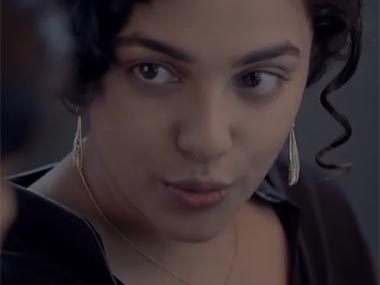“The new Mia ad takes ‘keeping it real’ seriously. It is a world in which women can buy their own jewellery, enjoy it and refused to be judged. It is a jewellery ad which says jewellery has its place in my world but it’s not central to my existence,” writes Nisha Susan on the women’s e-zine, The Ladies Finger. (Mobile/tablets users can check out the video here. )
It is a hearty endorsement of a new Tanishq ‘Mia’ advertisement that shows a young woman in big, dangly earrings getting ready for an important meeting when her lady boss tells her, “Eh, Megha, lose those, na? Let’s have the clients concentrate only on the presentation.”
A sad, sad Megha submits at first, but then rebels, sweeping into the conference room boldly flaunting her errant earrings. Catching her boss’s disapproving eye, she leans in and whispers, “Don’t worry. The presentation looks even better than me.”
“Revolution! Megha kills the Beauty Myth,” raves Susan.
[caption id=“attachment_988639” align=“alignleft” width=“380”] Screengrab from the Mia jewellery ad.[/caption]
Screengrab from the Mia jewellery ad.[/caption]
My response - and those of many of my women friends -was, umm, less enthusiastic.Some saw instead a contrived generational ‘chick-fight’ deployed to make young working women feel feminine, daring and bold at the expense of their older female colleagues.
“Why does Bosswoman look like she has life sucked out of her? That limp cotton saree and the mata_ji_ hairstyle,” remarked Anupama Bijur, resident editor at Magna Publishing. “And don’t think I didn’t notice that the Mia-jewellery-wearing model is fair and luminous while Bosswoman is brown, frumpy and strait-laced. Stereotyping much?”
Impact Shorts
More ShortsBesides, why not have a male boss play the bad guy? Or do the admakers think it is only older women who are eager to frump up their female subordinates in the name of professionalism? There is a very conscious attempt here to play one generation of women off the other, to make young women feel good about looking pretty at the expense of their older (and presumably, therefore, uglier) peers.
Setting generational battles aside, I, for one, didn’t understand why refusing to take a pair of earrings for a brief period of time constituted a feminist victory. Susan is right in observing that working women are “caught between the pressure to look good and the pressure to not look too good.” Look too ‘feminine’, and men may dismiss you as a bimbo. Don’t look sufficiently ‘feminine’, and you may be sidelined as an ugly battle-axe. Women often experience appearance-based bullying at the workplace in the name of professionalism. But a counter-message that tells women to looking good matters more than succeeding at work is hardly revolutionary.
Megha’s boss didn’t tell her to “lose” the earrings per se, just not to wear them to an important client meeting. And her over-the-top misery at being ‘deprived’ of her earrings for even an hour is outright bizarre. No working professional would jeopardise his/her standing with the boss and clients over a style accessory. A man would cheerfully whip off his designer tie if his boss told him it was ‘wrong’ for a presentation. So what exactly are we saying when we show a bright, young woman who supposedly put together an amazing presentation mope over a pair of earrings?
The subtext of this ad becomes all the more suspect when placed in the line of its broader Mia campaign which is aimed at young working women. An older commercial , for instance, assures an unhappy woman who receives a disappointing raise that her pretty baubles will make her “love to go to work despite the increments.” Another offers up jewellery as compensation for attending a boring workshop, panning to the bored model as she watches a motivational speaker roar, “Are we soaring high?”
For a woman, looking pretty - not soaring high -is what makes going to work worthwhile.
Now, there isn’t a single ad for male beauty product - be it deodorants, cleansers or those execrable fairness creams - that tells men that looking good is sufficient compensation for a lack of professional success. Not one such commercial shows a man looking dull and unengaged at work. Ad agencies always assure their male customers that their product will make them more successful, both at work and with women. Attractiveness is never sold as an end in itself for a man.
“I’m sure a bunch of men came up with this ad,” said a close friend who described witnessing an ad agency meeting where a roomful of men presented pitches that attempted to shame women into buying a beauty product. “You never sell stuff to women by telling them they’re ugly,” she said. Or telling a working woman that looking good is good enough. It is certainly not a blow against the beauty myth - or, for that matter, an incentive to buy a pair of distractingly unattractive earrings.
)